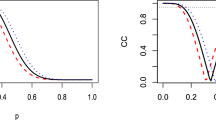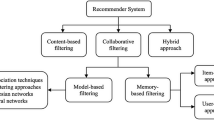Abstract
Latent factor models have become a workhorse for a large number of recommender systems. While these systems are built using ratings data, which is typically assumed static, the ability to incorporate different kinds of subsequent user feedback is an important asset. For instance, the user might want to provide additional information to the system in order to improve his personal recommendations. To this end, we examine a novel scheme for efficiently learning (or refining) user parameters from such feedback. We propose a scheme where users are presented with a sequence of pairwise preference questions: “Do you prefer item A over B?” User parameters are updated based on their response, and subsequent questions are chosen adaptively after incorporating the feedback. We operate in a Bayesian framework and the choice of questions is based on an information gain criterion. We validate the scheme on the Netflix movie ratings data set and a proprietary television viewership data set. A user study and automated experiments validate our findings.
Similar content being viewed by others
References
Sarma A D, Sarma A D, Gollapudi S, Panigrahy R. Ranking mechanisms in twitter-like forums. In: Proceedings of the 3rd ACM International Conference on Web Search and Data Mining. 2010, 21–30
Goldberg D, Nichols D, Oki B M, Terry D. Using collaborative filtering to weave an information tapestry. Communications of the ACM, 1992, 35(12): 61–70
Koren Y, Bell R, Volinsky C. Matrix factorization techniques for recommender systems. IEEE Computer, 2009, 42(8): 30–37
Agarwal D, Chen B C. Regression-based latent factor models. In: Proceedings of the 15th ACM SIGKDD International Conference on Knowledge Discovery and Data Mining. 2009, 19–28
Hu Y, Koren Y, Volinsky C. Collaborative filtering for implicit feedback datasets. In: Proceedings of the 8th IEEE International Conference on Data Mining. 2008, 263–272
Hacker S, von Ahn L. Matchin: eliciting user preferences with an online game. In: Proceedings of the 27th International Conference on Human Factors in Computing Systems. 2009, 1207–1216
Liu N N, Zhao M, Yang Q. Probabilistic latent preference analysis for collaborative filtering. In: Proceedings of the 18th ACM conference on Information and Knowledge Management. 2009, 759–766
Rendle S, Freudenthaler C, Gantner Z, Schmidt-Thieme L. BPR: Bayesian personalized ranking from implicit feedback. In: Proceedings of the 25th Conference on Uncertainty in Artificial Intelligence. 2009, 452–461
Boutilier C, Zemel R S, Marlin B. Active collaborative filtering. In: Proceedings of the 19th Conference in Uncertainty in Artificial Intelligence. 2003, 98–106
Jin R, Si L. A Bayesian approach toward active learning for collaborative filtering. In: Proceedings of the 20th Conference on Uncertainty in Artificial Intelligence. 2004, 278–285
Harpale A S, Yang Y. Personalized active learning for collaborative filtering. In: Proceedings of the 31st Annual International ACM SIGIR Conference on Research and Development in Information Retrieval. 2008, 91–98
Mackay D J C. Bayesian methods for adaptive models. Dissertation for the Doctoral Degree. Pasadena: California Institute of Technology, 1992
Minka T P. Expectation propagation for approximate Bayesian inference. In: Proceedings of the 17th Conference in Uncertainty in Artificial Intelligence. 2001, 362–369
Qi Y, Minka T P, Picard R W, Ghahramani Z. Predictive automatic relevance determination by expectation propagation. In: Proceedings of the 21st International Conference on Machine Learning. 2004
Park S T, Chu W. Pairwise preference regression for cold-start recommendation. In: Proceedings of the 3rd ACM Conference on Recommender Systems. 2009, 21–28
Elo A. The Rating of Chessplayers, Past and Present. New York: Arco Publications, 1978
Herbrich R, Minka, T, Graepel T. TrueSkillℳ: a Bayesian skill rating system. In: Proceedings of the 20th Annual Conference on Neural Information Processing Systems. 2007, 569–576
Author information
Authors and Affiliations
Corresponding author
Additional information
Suhrid Balakrishnan is a researcher in AT&T Labs, specializing in machine learning, particularly interested in accurate and efficient algorithms for statistical learning. He obtained his PhD in Computer Science from Rutgers University in 2007, and has been at AT&T Labs Research since he graduated. Suhrid is particularly interested in predictive modelling for recommender systems and computational advertising, and in general is motivated by the application of machine learning to real-world problems from domains like telecommunications, language, and biology.
Sumit Chopra received his PhD in Computer Science in 2008, from Courant Institute of Mathematical Sciences, at New York University, under the supervision of Prof. Yann Le-Cun. He is since a Senior Member of Technical Staff in the Statistics group at AT&T Labs-Research. His primary area of interest is machine learning and pattern recognition, with a focus towards automatic task specific feature-learning using multilayer non-linear connectionist architectures. His research has resulted in the development of efficient feature learning models, which can handle the uncertainties and interdependencies among samples in large scale data sets. These models have been applied to a variety of domains, such as, computer vision, robotics, economics, natural language processing, automatic speech recognition, and computational advertising.
Rights and permissions
About this article
Cite this article
Balakrishnan, S., Chopra, S. Two of a kind or the ratings game? Adaptive pairwise preferences and latent factor models. Front. Comput. Sci. 6, 197–208 (2012). https://doi.org/10.1007/s11704-012-2871-7
Received:
Accepted:
Published:
Issue Date:
DOI: https://doi.org/10.1007/s11704-012-2871-7




